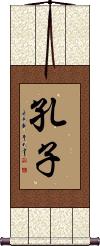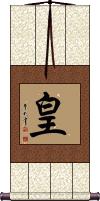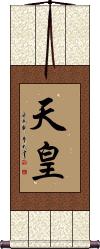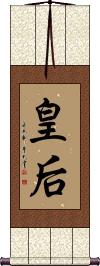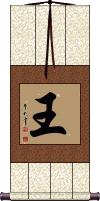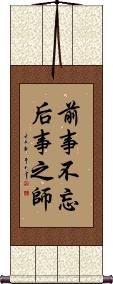Many custom options...
And formats...

Sovereign in Chinese / Japanese...
Buy a Sovereign calligraphy wall scroll here!
Personalize your custom “Sovereign” project by clicking the button next to your favorite “Sovereign” title below...
Confucius
孔子 is how to write the name of the great sage, known in the West as Confucius.
His real name is Kongzi (The name Confucius is a westernized version of his name - his family name is Kong, and “zi” was added as a title of distinction).
He lived some 2500 years ago in Qufu, a town in modern-day Shandong Province of Northern China (about 6 hours south of Beijing by bus). He was a consort to Emperors, and after his death, the impact of his philosophies still served to advise emperors, officials, and common people for generations.
Also during these thousands of years, the Kong family remained powerful in China, and the Kong estate was much like the Vatican in Rome. The Kong estate existed as if on sovereign ground with its own small garrison of guards and the privileges of a kingdom within an empire.
This was true up until the time the Kong family had to flee to Taiwan in 1949 when the Red Army took victory over the Nationalists during the Revolution. The home of Confucius was later razed and all statues were defaced or stolen during the Cultural Revolution. Finally, after years of smearing his name and image, it is once again okay to celebrate the teachings of Confucius in mainland China.
Known as Khổng Tử in Vietnamese.
Emperor
Emperor of Japan
天皇 is the title of the Emperor of Japan.
This title is used in China, Korea, and Japan to refer specifically to the Emperor of Japan.
Empress
皇后 is the title of empress/emperess, the female form of the emperor.
皇后 is used in Chinese, Japanese Kanji, and old Korean Hanja.
While the emperor's reign was for life, if he died, his wife would hold his power. In this case, a woman was the ultimate ruler of the greater part of East Asia (now China) until her death and the succession of the emperor's firstborn son to lead the empire. Numerous times in various Chinese dynasties, an empress took power in this way.
The first character means emperor by itself.
The second character alone can mean “wife of an emperor or king” (the first character clarifies that we are talking about an empress and not a queen). It can also mean sovereign or last offspring, depending on context.
Note: In some books, this word is translated as queen. While only incorrect if you get technical (because an empress is theoretically a higher level than a queen), the meaning is very similar.
皇后 is sometimes used for the title of queen, but more technically, this is the wife of the emperor (a higher level than a queen).
King
王 is wang which means king. It is not pronounced the way you think in Chinese. It is more like English speakers would want to pronounce wong. It has roughly the same vowel sound as tong, song, or long in English.
Note that this means king only, not the emperor. An emperor is higher than a king, and theoretically is chosen by God, according to ancient Chinese culture. However, the definition is often blurred at various points in Asian history.
王 can also be defined as ruler, sovereign, monarch, or magnate. It is also can refer to a game piece in the chess-like Japanese strategic game of shoji.
Note: This can also be a family name in Chinese, Korean and Vietnamese (in Vietnamese it's Vương).
See Also: Queen
Past experience is the teacher for the future
Past events not forgotten serve as teachers for later events.
The most literal translation to English of this ancient 前事不忘后事之师 Chinese proverb is:
“Past events not forgotten serve as teachers for later events.”
However, it's been translated several ways:
Don't forget past events, they can guide you in the future.
Benefit from past experience.
Past experience, if not forgotten, is a guide for the future.
Past calamity is my teacher.
A good memory for the past is a teacher for the future.
The remembrance of the past is the teacher of the future.
If one remembers the lessons of the past; They will serve as a guide to avoid mistakes in the future.
The origin:
This proverb comes from the 5th century B.C., just before the Warring States Period in the territory now known as China.
The head of the State of Jin, Zhi Bo, seized power in a coup. He did this with help from the armies of the State of Han and Wei. Instead of being grateful for the help from Han and Wei, he treacherously took the land of Han and Wei. Never satisfied, Zhi Bo employed the armies of Han and Wei to attack and seize the State of Zhao.
The king of Zhao took advice from his minister Zhang Mengtan and secretly contacted the Han and Wei armies to reverse their plans and attack the army of Zhi Bo instead. The plan was successful, and the State of Zhao was not only saved but was set to become a powerful kingdom in the region.
Zhang Mengtan immediately submitted his resignation to a confused king of Zhao. When asked why, Zhang Mengtan said, “I've done my duty to save my kingdom, but looking back at past experience, I know sovereign kings are never satisfied with the power or land at hand. They will join others and fight for more power and more land. I must learn from past experiences, as those experiences are the teachers of future events.”
The king could not dispute the logic in that statement and accepted Zhang Mengtan's resignation.
For generations, the State of Zhao continued to fight for power and land until finally defeated and decimated by the State of Qin (which led to the birth of the Qin Dynasty in 221 B.C.).
These search terms might be related to Sovereign:
...And This Above All to Thine Own Self Be True
Changing Oneself / Self Reformation
Consciousness of Self
Independent Spirit
Independent Spirit / Independent Heart
Inner Strength / Self-Improvement
Introspection / Self-Awareness
Jiko No Kansei / Self-Completion
Juggernaut / Absolute Power
Power of Oneself / Self-Sufficient
Prideful Mind / Self-Respecting Heart
Self Actualization
Self Awareness Becomes a Buddha
Self Consciousness
Self Sacrifice
Self-Confidence
Self-Control
Self-Defense
Self-Discipline / Will-Power
Self-Improvement
Self-Love / Love Yourself / Love Oneself
Self-Reliance
Self-Respect / Self-Esteem
Self-Restraint / Self-Control
The Supreme Mahayana Truth
To Thine Own Self Be True
Will-Power / Self-Control
Not the results for sovereign that you were looking for?
Below are some entries from our dictionary that may match your sovereign search...
| Characters If shown, 2nd row is Simp. Chinese |
Pronunciation Romanization |
Simple Dictionary Definition |
王 see styles |
wàng wang4 wang ou / o おう |
More info & calligraphy: King(n,n-suf) (1) king; ruler; sovereign; monarch; (n,n-suf) (2) tycoon; magnate; champion; master; (n,n-suf) (3) (abbreviation) {shogi} (See 王将・おうしょう・1) king (of the senior player); (surname) Wan rāja, king, prince, royal; to rule. |
馬 马 see styles |
mǎ ma3 ma uma(p); uma うま(P); ウマ |
More info & calligraphy: Horse(1) horse; (2) (See 競馬) horse racing; (3) (abbreviation) {shogi} (See 竜馬・2) promoted bishop; (4) {cards} knight (court card in mekuri karuta and unsun karuta); (surname) Me aśva, a horse; a stallion; one of the seven treasures of a sovereign. |
天皇 see styles |
tiān huáng tian1 huang2 t`ien huang tien huang tennou / tenno てんのう |
More info & calligraphy: Emperor of JapanEmperor of Japan; (place-name) Tennou Deva-king; the Tang monk 道悟 Daowu of the 天皇 Tianhuang monastery at 荊州 Jingzhou. |
無我 无我 see styles |
wú wǒ wu2 wo3 wu wo muga むが |
More info & calligraphy: Selflessness(1) selflessness; self-effacement; self-renunciation; (2) {Buddh} anatta; anatman; doctrine that states that humans do not possess souls; (female given name) Muga anātman; nairātmya; no ego, no soul (of an independent and self-contained character), impersonal, no individual independent existence (of conscious or unconscious beings, anātmaka). The empirical ego is merely an aggregation of various elements, and with their disintegration it ceases to exist; therefore it has nm ultimate reality of its own, but the Nirvāṇa Sūtra asserts the reality of the ego in the transcendental realm. The non-Buddhist definition of ego is that it has permanent individuality 常一之體 and is independent or sovereign 有主宰之用. When applied to men it is 人我, when to things it is 法我. Cf. 常 11. |
觀世音 观世音 see styles |
guān shì yīn guan1 shi4 yin1 kuan shih yin Kanzeon かんぜおん |
More info & calligraphy: Guan Shi Yin: Protector Of Life(out-dated kanji) Avalokiteshvara (Bodhisattva); Avalokitesvara; Kannon; Kwannon; Guanyin; Buddhist deity of compassion Regarder of the world's sounds, or cries, the so-called Goddess of Mercy; also known as 觀音; 觀世音善薩; 觀自在 (觀世自在); 觀尹; 光世音 (the last being the older form). Avalokiteśvara, v. 阿 8. Originally represented as a male, the images are now generally those of a female figure. The meaning of the term is in doubt; it is intp. as above, but the term 觀自在 (觀世自在) accords with the idea of Sovereign Regarder and is not associated with sounds or cries. Guanyin is one of the triad of Amida, is represented on his left, and is also represented as crowned with Amida; but there are as many as thirty-three different forms of Guanyin, sometimes with a bird, a vase, a willow wand, a pearl, a 'thousand' eyes and hands, etc., and, when as bestower of children, carrying a child. The island of Putuo (Potala) is the chief centre of Guanyin worship, where she is the protector of all in distress, especially of those who go to sea. There are many sūtras, etc., devoted to the cult, but its provenance and the date of its introduction to China are still in doubt. Chapter 25 of the Lotus Sūtra is devoted to Guanyin, and is the principal scripture of the cult; its date is uncertain. Guanyin is sometimes confounded with Amitābha and Maitreya. She is said to be the daughter of king Śubhavyūha 妙莊王, who had her killed by 'stifling because the sword of the executioner broke without hurting her. Her spirit went to hell; but hell changed into paradise. Yama sent her back to life to save his hell, when she was miraculously transported on a Lotus flower to the island of Poo-too'. Eitel. |
帝 see styles |
dì di4 ti mikado みかど |
emperor emperor (of Japan); mikado; (female given name) Mikado Ruler, sovereign; translit. t. |
胙 see styles |
zuò zuo4 tso himorogi ひもろぎ |
to grant or bestow; sacrificial flesh offered to the gods (old); blessing; title of a sovereign (old) (archaism) offerings of food (to the gods) |
臣 see styles |
chén chen2 ch`en chen omi; shin おみ; しん |
state official or subject in dynastic China; I, your servant (used in addressing the sovereign); Kangxi radical 131 (1) (archaism) retainer; attendant; (2) (おみ only) (archaism) (See 八色の姓) Omi (hereditary title; orig. one of the two highest such titles, later demoted to sixth highest of eight); (pronoun) (3) (しん only) (humble language) (used by a servant when speaking to their master) I; me; (surname) Tomi minister |
辟 see styles |
pì pi4 p`i pi heki へき |
penal law; variant of 闢|辟[pi4] false; punish; crime; law; ruler A prince, sovereign, lord; split; punish, repress; perverse; toady; quiet. |
七事 see styles |
qī shì qi1 shi4 ch`i shih chi shih shichiji しちじ |
(archaic) the seven duties of a sovereign (abbreviation) (See 七事式・しちじしき) seven tea ceremony procedures of the Senke school |
三德 see styles |
sān dé san1 de2 san te santoku |
The three virtues or powers, of which three groups are given below. (1) (a) 法身德 The virtue or potency of the Buddha's eternal, spiritual body, the dharmakāya; (b) 般若德 of his prājñā, or wisdom, knowing all things in their reality; (c) 解脫德 of his freedom from all bonds and his sovereign Iiberty. Each of these has the four qualities of 常, 樂我, 淨eternity, joy, personality, and purity; v. 漫涅槃經 (2) (a) 智德 The potency of his perfect knowledge; (b) 斷德 of his cutting off all illusion and perfecting of supreme nirvāṇa; the above two are 自利 for his own advantage; (c) 恩德 of his universal grace and salvation, which 利他 bestows the benefits he has acquired on others. (3) (a) 因圓德 The perfection of his causative or karmic works during his three great kalpas of preparation; (b) 果圓德 the perfection of the fruit, or results in his own character and wisdom; (c) 恩圓德 the perfection of his grace in the salvation of others. |
人君 see styles |
jinkun じんくん |
sovereign; ruler |
人皇 see styles |
rén huáng ren2 huang2 jen huang ninnou; jinnou; jinkou / ninno; jinno; jinko にんのう; じんのう; じんこう |
Human Sovereign, one of the three legendary sovereigns 三皇[san1 huang2] emperor |
佛頂 佛顶 see styles |
fó dǐng fo2 ding3 fo ting butchō |
Śākyamuni in the third court of the Garbhadhātu is represented as the佛頂尊 in meditation as Universal Wise Sovereign. The 五佛頂q.v. Five Buddhas are on his left representing his Wisdom. The three 佛頂 on his right are called 廣大佛頂, 極廣大佛頂, and 無邊音聲佛頂; in all they are the eight 佛頂.; A title of the esoteric sect for their form of Buddha, or Buddhas, especially of Vairocana of the Vajradhātu and Śākyamuni of the Garbhadhātu groups. Also, an abbreviation of a dhāraṇī as is | | | 經 of a sutra, and there are other | | | scriptures. |
元首 see styles |
yuán shǒu yuan2 shou3 yüan shou genshu げんしゅ |
head of state sovereign; ruler; head of state head |
六德 see styles |
liù dé liu4 de2 liu te rokutoku |
The six characteristics of a bhagavat, which is one of a Buddha's titles: sovereign, glorious, majestic, famous, propitious, honored. |
十地 see styles |
shí dì shi2 di4 shih ti juuji / juji じゅうじ |
{Buddh} dasabhumi (forty-first to fiftieth stages in the development of a bodhisattva); (place-name) Jūji daśabhūmi; v. 十住. The "ten stages" in the fifty-two sections of the development of a bodhisattva into a Buddha. After completing the十四向 he proceeds to the 十地. There are several groups. I. The ten stages common to the Three Vehicles 三乘 are: (1) 乾慧地 dry wisdom stage, i. e. unfertilized by Buddha-truth, worldly wisdom; (2) 性地 the embryo-stage of the nature of Buddha-truth, the 四善根; (3) 八人地 (八忍地), the stage of the eight patient endurances; (4) 見地 of freedom from wrong views; (5) 薄地 of freedom from the first six of the nine delusions in practice; (6) 離欲地 of freedom from the remaining three; (7) 巳辨地 complete discrimination in regard to wrong views and thoughts, the stage of an arhat; (8) 辟支佛地 pratyeka-buddhahood, only the dead ashes of the past left to sift; (9) 菩薩地 bodhisattvahood; (10) 佛地 Buddhahood. v. 智度論 78. II. 大乘菩薩十地 The ten stages of Mahāyāna bodhisattva development are: (1) 歡喜地 Pramuditā, joy at having overcome the former difficulties and now entering on the path to Buddhahood; (2) 離垢地 Vimalā, freedom from all possible defilement, the stage of purity; (3) 發光地 Prabhākarī, stage of further enlightenment; (4) 焰慧地 Arciṣmatī, of glowing wisdom; (5) 極難勝地 Sudurjayā, mastery of utmost or final difficulties; (6) 現前地 Abhimukhī, the open way of wisdom above definitions of impurity and purity; (7) 遠行地 Dūraṁgamā, proceeding afar, getting above ideas of self in order to save others; (8) 不動地 Acalā, attainment of calm unperturbedness; (9) 善慧地 Sādhumatī, of the finest discriminatory wisdom, knowing where and how to save, and possessed of the 十力 ten powers; (10) 法雲地 Dharmamegha, attaining to the fertilizing powers of the law-cloud. Each of the ten stages is connected with each of the ten pāramitās, v. 波. Each of the 四乘 or four vehicles has a division of ten. III. The 聲聞乘十地 ten Śrāvaka stages are: (1) 受三歸地 initiation as a disciple by receiving the three refuges, in the Buddha, Dharma, and Saṅgha; (2) 信地 belief, or the faith-root; (3) 信法地 belief in the four truths; (4) 内凡夫地 ordinary disciples who observe the 五停心觀, etc.; (5) 學信戒 those who pursue the 三學 three studies; (6) 八人忍地 the stage of 見道 seeing the true Way; (7) 須陀洹地 śrota-āpanna, now definitely in the stream and assured of nirvāṇa; (8) 斯陀含地 sakrdāgāmin, only one more rebirth; (9) 阿那含地 anāgāmin, no rebirth; and (10) 阿羅漢地 arhatship. IV. The ten stages of the pratyekabuddha 緣覺乘十地 are (1) perfect asceticism; (2) mastery of the twelve links of causation; (3) of the four noble truths; (4) of the deeper knowledge; (5) of the eightfold noble path; (6) of the three realms 三法界; (7) of the nirvāṇa state; (8) of the six supernatural powers; (9) arrival at the intuitive stage; (10) mastery of the remaining influence of former habits. V. 佛乘十地 The ten stages, or characteristics of a Buddha, are those of the sovereign or perfect attainment of wisdom, exposition, discrimination, māra-subjugation, suppression of evil, the six transcendent faculties, manifestation of all bodhisattva enlightenment, powers of prediction, of adaptability, of powers to reveal the bodhisattva Truth. VI. The Shingon has its own elaborate ten stages, and also a group 十地十心, see 十心; and there are other groups. |
君主 see styles |
jun zhǔ jun1 zhu3 chün chu kunshu くんしゅ |
monarch; sovereign monarch; sovereign; ruler; liege (lord) ruler |
君王 see styles |
jun wáng jun1 wang2 chün wang kimio きみお |
sovereign king (female given name) Kimio |
四恩 see styles |
sì ēn si4 en1 ssu en shion しおん |
{Buddh} four gratitudes (to one's parents, all living beings, one's sovereign and the Three Jewels); four obligations; (surname) Shion four kinds of compassion |
国主 see styles |
kokushu こくしゅ |
(1) king; sovereign; (2) (hist) daimyo with a domain of one or more provinces (Edo period); (personal name) Kuninushi |
国君 see styles |
kokkun こっくん |
(form) ruler of a country; sovereign; monarch |
国書 see styles |
kokusho こくしょ |
(1) diplomatic message sent by a head of state; sovereign letter; (2) book written in Japanese (as opposed to Chinese, etc.); Japanese book; national literature (of Japan) |
国権 see styles |
kokken こっけん |
power of the state; national sovereignty; sovereign rights; (given name) Kokuken |
国王 see styles |
kokuou / kokuo こくおう |
(1) king; queen; monarch; sovereign; (2) {law} the Crown (as a focus of authority in the UK, etc.); the throne |
地皇 see styles |
dì huáng di4 huang2 ti huang |
Earthly Sovereign, one of the three legendary sovereigns 三皇[san1 huang2] |
大政 see styles |
taisei / taise たいせい |
sovereign power; the reins of government; (personal name) Hiromasa |
天王 see styles |
tiān wáng tian1 wang2 t`ien wang tien wang tennou / tenno てんのう |
emperor; god; Hong Xiuquan's self-proclaimed title; see also 洪秀全[Hong2 Xiu4 quan2] (1) {Buddh} heavenly king; (2) (See 牛頭天王) Gozu Tenno (deity said to be the Indian god Gavagriva); (place-name, surname) Tennou Maharāja-devas; 四天王 Caturmahārāja. The four deva kings in the first or lowest devaloka, on its four sides. E. 持國天王 Dhṛtarāṣṭra. S. 增長天王 Virūḍhaka. W. 廣目天王 Virūpākṣa. N. 多聞天王 Dhanada, or Vaiśravaṇa. The four are said to have appeared to 不空 Amogha in a temple in Xianfu, some time between 742-6, and in consequence he introduced their worship to China as guardians of the monasteries, where their images are seen in the hall at the entrance, which is sometimes called the 天王堂 hall of the deva-kings. 天王 is also a designation of Siva the 大白在, i. e. Maheśvara 摩醯首羅, the great sovereign ruler. |
帝王 see styles |
dì wáng di4 wang2 ti wang teiou / teo ていおう |
regent; monarch sovereign; emperor; monarch a major king |
帝釋 帝释 see styles |
dì shì di4 shi4 ti shih taishaku たいしゃく |
(surname) Taishaku Sovereign Śakra; Indra; 能天帝 mighty lord of devas; Lord of the Trayastriṃśas, i.e. the thirty-three heavens 三十三天 q. v.; he is also styled 釋迦提桓因陀羅 (or 釋迦提婆因陀羅) (or 釋迦提桓因達羅 or 釋迦提婆因達羅); 釋帝桓因 Śakra-devānām Indra. |
Click here for more sovereign results from our dictionary
The following table may be helpful for those studying Chinese or Japanese...
| Title | Characters | Romaji (Romanized Japanese) | Various forms of Romanized Chinese | |
| Confucius | 孔子 | koushi / koshi | kǒng zǐ / kong3 zi3 / kong zi / kongzi | k`ung tzu / kungtzu / kung tzu |
| Emperor | 皇 | kou / ko | huáng / huang2 / huang | |
| Emperor of Japan | 天皇 | ten nou / tennou / ten no | tiān huáng tian1 huang2 tian huang tianhuang | t`ien huang tienhuang tien huang |
| Empress | 皇后 | kou gou / kougou / ko go | huáng hòu huang2 hou4 huang hou huanghou | |
| King | 王 | ou / o | wáng / wang2 / wang | |
| Past experience is the teacher for the future | 前事不忘后事之師 前事不忘后事之师 | qián shì bú wàng hòu shí zhī shī qian2 shi4 bu2 wang4 hou4 shi2 zhi1 shi1 qian shi bu wang hou shi zhi shi | ch`ien shih pu wang hou shih chih shih chien shih pu wang hou shih chih shih |
|
| In some entries above you will see that characters have different versions above and below a line. In these cases, the characters above the line are Traditional Chinese, while the ones below are Simplified Chinese. | ||||
Successful Chinese Character and Japanese Kanji calligraphy searches within the last few hours...
